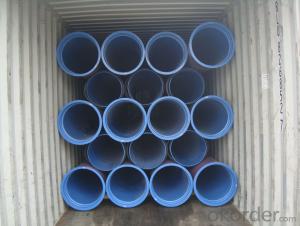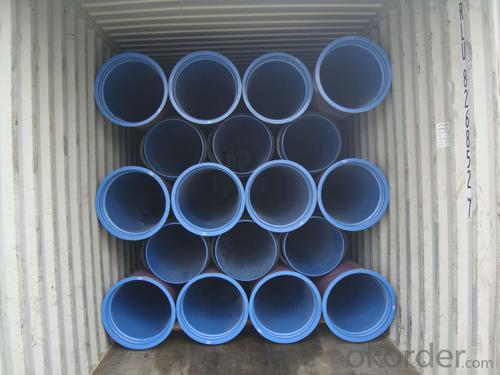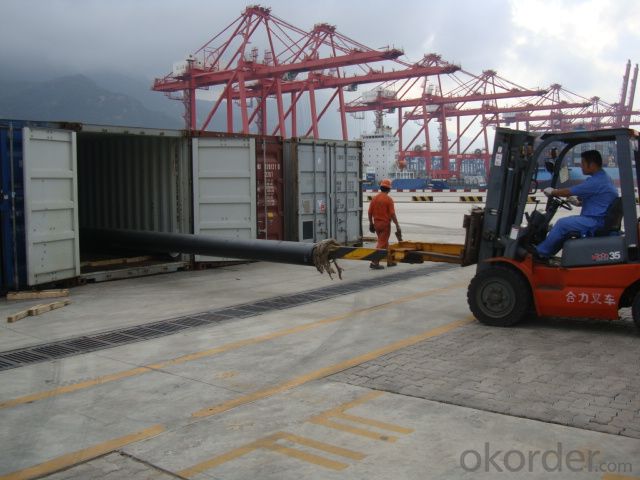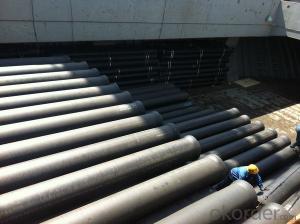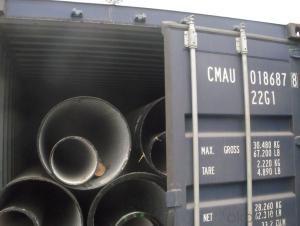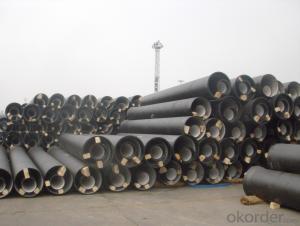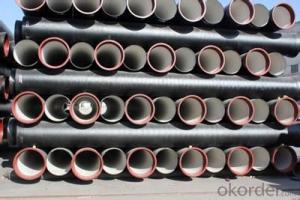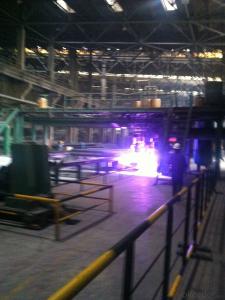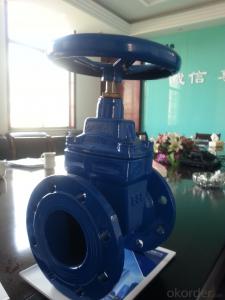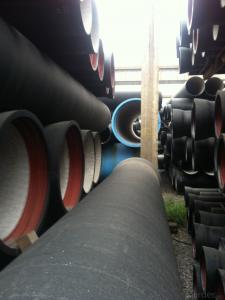DUCTILE IRON PIPES AND PIPE FITTINGS K8 CLASS DN1700
- Loading Port:
- Tianjin
- Payment Terms:
- TT OR LC
- Min Order Qty:
- 22 pc
- Supply Capability:
- 3000 pc/month
OKorder Service Pledge
OKorder Financial Service
You Might Also Like
Material : Ductile Cast Iron
Size Range : DN 80mm to DN 2000mm
Unit Effective Length : 6m or 5.7m
Manufacture Standard: ISO 2531:1998/ EN 545:2006/EN 598:2007
Annual capacity : 200,000 tons
Coating Exterior: Zinc 130g/m2 according to ISO 8179-1 and bitumen coating 70 microns.
Cement Interior: Portland Cement/ High Alumina Cement/ Sulphate Resisting Cement Lining according to ISO 4179
Special requirements on external coating and internal lining can be applied
We also provide accessories such as SBR/EPDM rubber gaskets, lubricant paste, pipe caps, PE sleeves, etc.
Additional Parts:
Each pipe is strictly inspected according to related standard to ensure permanently high performance.
Easy Installation at site and service free for life
Long Service Lifespan
Quotation will arrive you within 24hours once we get your inquiry.
We guarantee offering you a competitive price.
A copy of original inspection reports of pipes will be offered after shipment.
Photos of loading process will be sent to the customer after shipment effect.
We will follow-up the delivery progress after shipment effect and update to the customer on weekly basis.
- Q: How are ductile iron pipes protected against internal corrosion?
- To safeguard ductile iron pipes from internal corrosion, a range of preventive measures are implemented. The foremost technique involves the application of a protective coating on the pipe's inner surface. This coating acts as a barrier that separates the pipe from the conveyed fluid, thereby minimizing the risk of direct contact and corrosion. Another commonly employed method is the usage of a cement mortar lining, which fortifies the protective barrier, thereby reducing the possibility of corrosion, even in aggressive environments. Moreover, this lining ensures a smoother surface, enhancing fluid flow by diminishing friction. Apart from coatings and linings, ductile iron pipes are often designed with corrosion-resistant alloys or additives. These alloys, such as zinc or epoxy, are incorporated during the manufacturing process, offering an additional layer of defense against internal corrosion. They function as sacrificial anodes, corroding over time to shield the underlying iron from degradation. Regular maintenance and inspection play a vital role in safeguarding ductile iron pipes against internal corrosion. Monitoring the condition of protective coatings, identifying any signs of degradation or damage, and promptly addressing such issues are imperative to ensure the long-term integrity of the pipes. In summary, a combination of protective coatings, cement mortar linings, corrosion-resistant alloys, and regular maintenance efforts collaboratively safeguard ductile iron pipes against internal corrosion. This approach prolongs their lifespan and guarantees the secure transportation of fluids.
- Q: What is the expected joint restraint method for ductile iron pipes?
- The expected joint restraint method for ductile iron pipes is typically mechanical joints or push-on joints. These joints provide a secure and leak-free connection between the pipes, ensuring the stability and integrity of the pipeline system. Mechanical joints involve the use of rubber gaskets and bolts to tightly seal the joint, while push-on joints utilize a groove and rubber gasket system to create a watertight seal. Both methods offer excellent joint restraint capabilities, allowing for the effective transmission of fluids or gases through the pipeline without the risk of joint separation or failure. Additionally, these joint restraint methods also facilitate ease of installation and maintenance, making them a preferred choice for ductile iron pipe systems.
- Q: How much is the installation of cast iron pipe drainage 1 meters?
- Water supply pipe is the first choice, with high cost performance. Compared with the PE pipe, from the installation time, ductile pipe PE pipe installation is simple and rapid, and after the installation of internal and external bearing pressure better;
- Q: Can ductile iron pipe be used for irrigation systems?
- Yes, ductile iron pipe can be used for irrigation systems. It is a strong and durable material that can withstand the pressures and demands of irrigation applications, making it a suitable choice for transporting water in agricultural settings.
- Q: Water supply pipe is ductile iron, then it's fittings and valves and other parts must be ductile iron?
- Not always。Valve material selection is mainly determined by the fluid medium.The medium can be divided into gas, liquid, corrosive gas, liquid and oil. According to different media, temperature, and pressure levels, choose different materials, plastic, cast iron, cast steel, stainless steel and so on.
- Q: How does the white iron appear in the case of ductile iron?
- The addition of 0.2% SiC in the raw iron water can effectively reduce the chill.
- Q: The difference between spheroidal graphite cast iron pipe and HDPE water supply pipe
- As the HDPE pipe is made of hot melt connection, the construction is more difficult, and the installation cost is about 40% higher than that of the nodular cast iron pipe.
- Q: What is the typical diameter range of ductile iron pipes?
- The typical diameter range of ductile iron pipes is between 4 inches and 64 inches.
- Q: How many meters does the cast iron water supply pipe dn150,1 tons?
- Centrifugal ductile iron pipe water-cooled metal type centrifuge daira executed by.Dg100 mm following the closed mold mold jacket cooling, more than Dg150rnm with rain type cooling.
- Q: Can ductile iron pipe be used for marine applications?
- Yes, ductile iron pipe can be used for marine applications. It is corrosion-resistant and has high strength, making it suitable for various marine environments and applications such as underwater pipelines, dock construction, and seawater intake systems.
Send your message to us
DUCTILE IRON PIPES AND PIPE FITTINGS K8 CLASS DN1700
- Loading Port:
- Tianjin
- Payment Terms:
- TT OR LC
- Min Order Qty:
- 22 pc
- Supply Capability:
- 3000 pc/month
OKorder Service Pledge
OKorder Financial Service
Similar products
Hot products
Hot Searches
Related keywords
